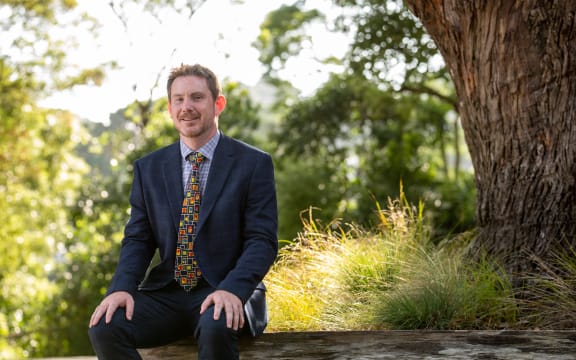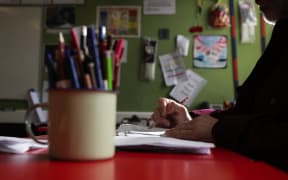
Photo: AFP
Science teachers are shocked that an advance version of the draft school science curriculum contains no mention of physics, chemistry or biology.
The so-called "fast draft" said science would be taught through five contexts - the Earth system, biodiversity, food, energy and water, infectious diseases and "at the cutting edge".
It was sent to just a few teachers for their feedback ahead of its release for consultation next month, but some were so worried by the content they leaked it to their peers.
Teachers who had seen the document told RNZ they had grave concerns about it. It was embarrassing, and would lead to "appalling" declines in student achievement, they said.
One said the focus on four specific topics was likely to leave pupils bored with science by the time they reached secondary school.
But another teacher told RNZ the document presented a "massive challenge" to teachers and the critics were over-reacting.
"It's the difference from what's existed before and the lack of content is what's scaring people. It's fear of the unknown," he said.
Association of Science Educators president Doug Walker said he was shocked when he saw a copy.

Doug Walker. Photo: Supplied / Prime Minister's Science Prizes
"Certainly in its current state I would be extremely concerned with that being our guiding document as educators in Aotearoa. The lack of physics, chemistry, Earth and space science, I was very surprised by that," he said.
The MInistry of Education should now sit down with science subject associations to get some open, honest and constructive feedback about what the science curriculum should include, Walker said.
New Zealand Institute of Physics education council chairman David Housden said physics teachers were not happy either.
"We were shocked. I think that physics and chemistry are fundamental sciences and we would expect to find a broad curriculum with elements of it from space all the way down to tiny particles," he said.
Institute president Joachim Brand said he was worried teenagers would finish school without learning fundamental knowledge about things like energy and matter.
He warned the draft was heavy on philosophy and light on actual science.
"There is too little science content. Science needs to be learned by actually doing it to some degree. You need to be exposed to the ideas of how maybe atoms work, how electricity works, how electric forces and if that is not specified and you're only given these broad contexts, then I'm really worried there will be huge gaps," he said.
Brand said if the draft went ahead, fewer students would specialise in science and universities might find themselves forced to teach basic science to new students.
Secondary Chemistry Educators New Zealand co-chairperson Murray Thompson said after he read the document he was left asking where the science was.
"The stuff in there is really interesting, but we have to teach basic science first. Where's the physics and chemistry and why can't we find words like force and motion and elements and particles, why aren't those words in there?
"It's the same mistake that they made with maths and literacy. They said 'here's the system, here's the way' and the maths was all about problem-solving and written problems and all that stuff without the basic skills," Thompson said.
Michael Johnston from the New Zealand Initiative blew the whistle on the draft document after it was leaked to him.
He said if the curriculum did not change a lot would depend on the content of the achievement standards used to assess students for the NCEA qualification.
"It would be a very strange situation where the standards for NCEA didn't reflect the curriculum but if they did still have those key concepts, then those key concepts would obviously be taught. The assessment system will trump the curriculum every time if there's some kind of conflict," he said.
Walker said schools could still teach physics and chemistry if the draft became final, but it should not be left to chance.
"The problem is that some educators would look at the document and say, 'Okay, I can do this, this and this' and you might plan your course around that, but then not do justice to all of these other really important areas," he said.
Holistic approach
But one of the curriculum writers, director of the Wilf Malcolm Institute of Educational Research at the University of Waikato Cathy Buntting, rubbished suggestions key areas physics and chemistry would not be taught.
"Absolutely not. But they will be teaching the chemistry and the physics that you need to engage with - the big issues of our time - and in order to engage with the excitement of science and the possibilities that science offers," she said.
However, Buntting said the document was intended to encourage change.
"What we are pushing towards with the current fast draft is more of a holistic approach to how the different science concepts interact with each other rather than a purist, siloed approach."
Buntting said the draft was very high-level, as were curriculum documents for other subjects but it was clear it needed more clarity about where teachers should expect to teach various science concepts.
Education Minister Jan Tinetti said there was no question the final curriculum would include chemistry, physics and biology and other core science topics.
"The Ministry of Education, experts and the sector are working on a new curriculum and are testing different options - this is essentially a draft of a draft."
Learning sciences was important and it was also important that science was taught in the best way possible, she said.
The Ministry of Education said it was still finalising the draft document.
"We are currently in the process of completing the draft science content based on feedback from fast testing, as well as being guided by national and international research such as PISA (Programme for International Student Assessment).
"We will then go out for wider sector and public feedback from August to late October this year, with a full draft, and sufficient time for people to give us feedback," it said.







